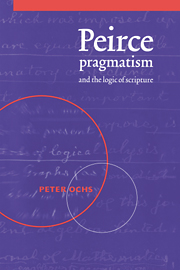7 - Irremediable vagueness in Peirce's pragmaticist writings: a plain-sense reading
Published online by Cambridge University Press: 22 October 2009
Summary
In his 1877–8 “Illustrations of the Logic of Science,” Peirce first offered his pragmatism to the world. In a series of articles published in the Monist in 1905, he threatened to take his pragmatism back. He claimed that, in the intervening years, the scholarly world had misrepresented what pragmatism really means, forcing him to re-explain and, in fact, rename it. Speaking of himself, he wrote
His word “pragmatism” has gained general recognition in a generalized sense that seems to argue power of growth and vitality. The famed psychologist, James, first took it up … Next, the admirably clear and brilliant thinker, Mr. Ferdinand C. S. Schiller … So far all went happily. But at present, the word begins to be met with occasionally in the literary journals, where it gets abused in the merciless way that words have to expect when they fall into literary clutches … So then, the writer, finding his bantling “pragmatism” so promoted, feels that it is time to kiss his child good-by and relinquish it to its higher destiny; while to serve the precise purpose of expressing the original definition, he begs to announce the birth of the word “pragmaticism,” which is ugly enough to be safe from kidnappers.
We might take Peirce's protestations with a little grain of salt. As Peirce averred in a footnote, he had never previously made popular use of the term “pragmatism” in writing.
Information
- Type
- Chapter
- Information
- Peirce, Pragmatism, and the Logic of Scripture , pp. 161 - 245Publisher: Cambridge University PressPrint publication year: 1998
